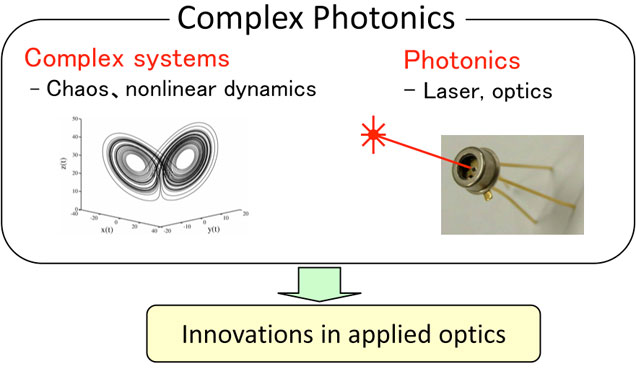General presentation of our research activities
(2) What is Complex Photonics?
Complex Photonics is an interdisciplinary research domain combining two fields of science: complex systems and photonics [1]. On the one hand, complex systems cover the concepts of chaos and nonlinear dynamics. On the other hand, photonics is the field of science dedicated to study lasers and optics. Complex photonics has emerged by uniting the technological progress accomplished in parallel in those two domains of science, opening the way to novel research activities.
 Figure1: Complex photonics
Figure1: Complex photonics
In complex photonics, simple systems may show complex behaviours and complex systems may show simple behaviours. As a result, it can be presented as a discipline handling with counter-intuitive phenomena. The former can be illustrated by a semiconductor laser with optical feedback. In this case, the simple presence of a feedback causes the emitted light to show irregular complex temporal dynamics. The latter can be illustrated by the phenomenon of chaos synchronization. In this case, when two lasers exhibiting chaotic behaviours get mutually coupled, their two respective chaotic waveforms can show exactly the same temporal evolutions, demonstrating a phenomenon known as synchronization.
Complex photonics aims at handling with optical technology representative of laser systems. The main research activity consists in shaping engineering applications taking advantage of the coherence properties of the light generated by lasers. The intrinsic nonlinearity of laser devices is known for naturally yielding unstable phenomena in the emitted beam. Up to now, preventing these nonlinear effects was in consequence necessary when developing applications in photonics.
However, in recent years, intentionally generating chaos in lasers has become an active objective for applications in the field of optical telecommunications, jointly exploiting the promising properties of speed of lasers and complexity of chaos. Complex photonics, or complex optical phenomena occurring in laser systems, has been drawing considerable attention. Especially, applications such as secure optical communications, fast physical random number generation or data security are the object of intense and thriving research efforts.
We carry out research on complex photonics both from a fundamental point of view and oriented to engineering applications by combining laser and chaos advantages. However, research in complex photonics is not restricted to this. Complex systems or phenomena observed in photonics (optics) are considered as a discipline of its own. Fruitful research activities in the field of complex photonics are highly expected in high number in the coming years.
- Reference:
- [1] M. C. Soriano, J. García-Ojalvo, C. R. Mirasso, and I. Fischer, Reviews of Modern Physics, Vol. 85, pp. 421-470 (2013).
